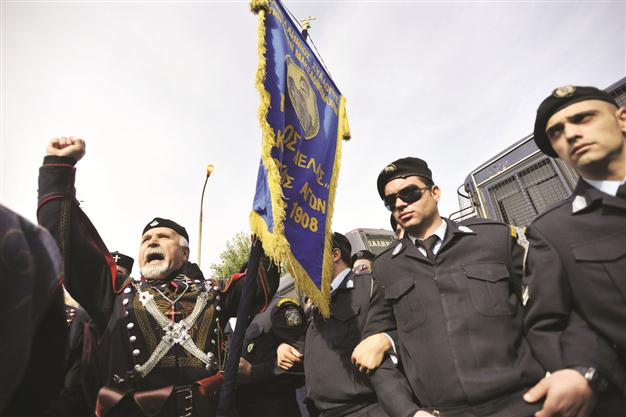Greeks ease fears of coup
ATHENS / LONDON

A man dressed in the uniform of Greek irregulars who fought Bulgarian guerrillas over control of Macedonia in the early 20th century, (L), waves a banner ahead of a scheduled military parade in Thessaloniki. AP photo
Greece teetered on the edge of chaos on Nov. 1, with military chiefs replaced ahead of a confidence vote that could bring down the government after the prime minister’s call for a referendum on the country’s EU debt deal.Amid the debt turmoil that could see his Cabinet fall in a confidence vote today, a state security council chaired by Prime Minister George Papandreou replaced the heads of the General Staff, the Army, Navy and Air Force and discharged a dozen Army and Navy officers, according to a Defense Ministry statement.
Greeks have largely shrugged off suggestions by foreign media that the firing top generals might have been aimed at thwarting a coup. In May, the Central Intelligence Agency warned in a report that the biggest threat for Greece was a military coup. Nevertheless, experts on Greek politics say the move could signal haste on the part of Papandreou’s Cabinet to make sweeping changes before it loses office amid the deepening crisis over debt. Defense Ministry officials described the move as a long-planned one to shrink the army at a time of spending cuts, but opponents said the timing was suspicious. The conservatives accused Papandreou of trying to stack the military with loyalists.
“Yesterday as the government was being rocked by turmoil over the confidence vote and deputies were deserting it to become independent, they thought it was the best time to make party appointments in the sensitive area of the Armed Forces,” said the opposition New Democracy’s leader, Antonis Samaras. Defense Minister Panos Beglitis told parliament yesterday there was no political motive in the timing of the shakeup. It had been due to take place in August, he said, but he had delayed it because of a flare-up in tensions with Turkey. “When the tensions eased, we had an obligation to change the military leadership.”
Greeks have been deeply sensitive about any suggestion that their military is taking a political role since a junta that seized power in 1967 left power in 1974. Papandreou’s grandfather, a veteran politician and former prime minister, died aged 80 under their house arrest. Squeezed by budget cuts, the military now flexes its muscles mainly during floods and earthquakes. Last month it was summoned to help collect garbage piling up in Athens due to a strike. In its reduced role, it has won public favor; a 1996 survey showed the army beat out the church as the Greeks’ favorite institution. Military sources said the move to replace the chiefs may have been hastened by a protest against austerity measures that halted a major national parade last week. The annual military parade in Thessaloniki is one of the most symbolic events in Greece’s political calendar, honoring its fight against fascism in World War II, and it was the first time it had been cancelled.
















